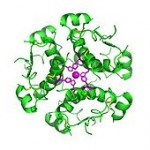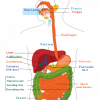Possible Future Treatment for Type 1 Diabetes
 Insulin, a hormone produced by the pancreas, signals cells to remove glucose from the blood and store it as glycogen. Glucagon is a protein also produced by cells in the pancreas but it has the opposite effect of insulin. When blood glucose levels are low, glucagon causes the breakdown of glycogen into glucose that is then released into the blood. The insulin is made in beta cells, where as the glucagon is made in alpha cells. In patients with type 1 diabetes, the immune system attacks the beta cells, eliminating insulin production.
Insulin, a hormone produced by the pancreas, signals cells to remove glucose from the blood and store it as glycogen. Glucagon is a protein also produced by cells in the pancreas but it has the opposite effect of insulin. When blood glucose levels are low, glucagon causes the breakdown of glycogen into glucose that is then released into the blood. The insulin is made in beta cells, where as the glucagon is made in alpha cells. In patients with type 1 diabetes, the immune system attacks the beta cells, eliminating insulin production.
Scientists from the University of Geneva have shown that alpha cells in the pancreas of mice have changed to insulin producing beta cells. In the study, approximately 5 % of the alpha cells became beta cells. The response seen only occurs in mice when the majority of the beta cells have been eliminated. If scientists can find a way to encourage human cells to transform in a similar way while preventing the immune system from destroying the new cells, even a small percentage of new beta cells could make a huge difference in the life of a diabetic.
Identification of the mechanisms that transform alpha cells into beta cells will not only help in the treatment of diabetes but can reveal insights into the ability to direct changes in other cells, including cancer.
PDF of the Article In Nature:
http://www.nature.com/nature/journal/vaop/ncurrent/pdf/nature08894.pdf
| Print article | This entry was posted by admin on April 5, 2010 at 12:04 pm, and is filed under DNA From The Beginning. Follow any responses to this post through RSS 2.0. You can skip to the end and leave a response. Pinging is currently not allowed. |


